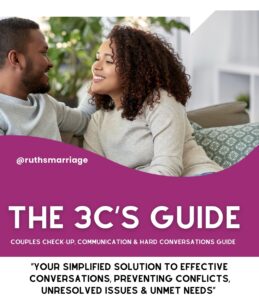One of the common requests I get from individuals or couples in my sessions is the need to want to change their spouse or want their spouse to change. So let me ask you “Have you tried to change things about your spouse that annoy or bother you?” Or to change those things about your spouse that you consider undesirable? Have you been successful? “How has that worked for you?” I’m certain your answer is not really – it hasn’t been successful trying to change them. And the reason is simple, we do not have capacity to change a human being even if our motives are to make the relationship better
The first step to restoring your marriage is admitting that you cannot control an adult to go by your ways or methods. People change mostly when they see a way that is better than theirs, so instead of trying to change your spouse, I say influence them.
Marriage is a beautiful bond between two individuals who promise to love and cherish each other for a lifetime. However, every relationship goes through ups and downs, and more importantly, we will experience seasons and challenges that will test our love for each other. If you’re one of those couples who feels like changing their marriage, don’t lose heart just yet, you can change your marriage, just not the way you are thinking.
In this article, we’ll discuss four effective ways to change your marriage and make it stronger than ever.
1. Change Yourself First:
In any relationship, it’s important to remember that change starts with YOU. This is especially true in marriage, where two individuals come together to build a life together. When things aren’t working out very well in our marriage, it’s very easy to get so caught up in trying to get our partner to do something different, such as really hear us or pay more attention to us or appreciate us more, or show us more empathy, that we do not see how our own thoughts, reactions, and attempted solutions to the problem become part of the problem. “Trying to change your spouse rarely works if you are actively trying to change your spouse” because the more you focus on your spouse’s faults, the more withdrawn and defensive your partner is likely to become. Feelings of anger, hurt, loneliness, and frustration increase as each of you retreat further and further into frustrated positions.
As this pattern unfolds, couples end up distancing themselves so much from each other that they lose touch with the bonds that held them together in the first place. So if you are really going to change your marriage, start by changing yourself. It means being willing to look inward, to identify areas for improvement, and to put in the work to become a better partner. By focusing on self-improvement, you can bring more positivity, love, and understanding to the marriage, creating a stronger foundation for the future. When you change yourself, you are more likely to influence a change in your spouse. A better spouse motivates and influences.

2. Change the Way you Communicate:
Communication is the bedrock of any relationship or marriage. Every single thing that we do in marriage starts from communication so it’s very important that we get communication right if we are going to change or restore our marriage. A major part of why couples are frustrated or disconnected is because we are not communicating our needs and feelings and we struggle with really understanding each other.
If you find yourself in a situation where you’re not satisfied with your partner’s behavior, it’s important to communicate your feelings effectively. Instead of focusing on what they’re not doing, try shifting your attention to what you would like them to do. By doing so, you’re creating a more positive and solution-oriented conversation that can lead to better outcomes.
Remember what I said in the previous point that change starts from YOU. You have to think about how you say the things that you want to say, your attitude, your demeanor and everything that ties around your words. Are you communicating in love? Or are you communicating in bitterness and resentment? Are you communicating with kindness? Are you being clear and direct in the things you are asking for? Are you communicating respectfully? All of these factors will determine how your partner will receive what you are saying in the marriage and whether it will make a positive or negative impact in your marriage.
Certain studies report that 90% of what people fight about in relationships is not about the content of what they say but about how they say it. Another very important aspect of communication is how you listen to your spouse, I like to say it as – how you take the information that they give you. And are you usually reactive or responsive? Being responsive instead of reactive means that you process the things that your spouse says to you without personalizing it.
Listening is not just about hearing the words, it is about understanding. To be a good listener, you have to be curious, you have to ask questions, you have to mirror the things they say to you. Active listening is seeking to understand rather than respond. The more you are able to both communicate effectively in your marriage, the more you will be able to transform your marriage.
A great resource to help you actively work on communication and navigating difficult conversations is one of my best seller resource which I call The 3C’s Guide. You can get the Guide Here!
3. Change the Way you See Them:
I remember the first year in our marriage where I focused on my spouse being the problem, I would tell myself if he stopped acting a certain way, our marriage would be better. After an argument or a misunderstanding we have, I would ruminate on all the mistakes he made and all the ways he spoke to me during the argument that was not good enough and make a conclusion that he was the problem. The more I saw him as the problem, the harder it was for me to fully act right towards him in the marriage. I stopped seeing all the negative behaviors and habits that I was also contributing to the marriage, my focus was on him changing.
When dealing with difficult situations with our spouses, it’s important to remember that how you perceive them can greatly impact on how you respond. If you view them as the problem, you may inadvertently treat them as such, which can lead to further complications. Instead, try changing your perspective and see them as human beings with their own unique experiences and struggles. By doing this, you may be able to approach the situation with more understanding and empathy, leading to a more positive outcome for everyone involved. Remember, how you see things can greatly influence how you react to them.
4. Change your Expectations:
In marriage, we have expectations of our partner in many areas!
However, we often don’t make these expectations clear. Or they might be unrealistic, outdated, or hard for our partner to fulfill. Infact our partners might not consider those expectations relevant. Yet we often get mad at our partners for not meeting them!
Have you ever stopped to consider what it is that you really expect from your spouse, or what your spouse expects from you, and why? You may be surprised by the answers, which are probably influenced by upbringing, past relationships, and maybe even romantic ideas of what marriage or love “should be” like. On the other hand, you may also find that your expectations are completely different from your spouse’s expectations.
It’s important to realize that expectations can often lead to disappointment, especially when they are not met. Do you ever expect your partner to read your mind? Do you feel like they should just know certain things? Do you expect them to just love and adore your family, as much as you do? You may be suffering from unrealistic expectations. Of course, one person’s “unrealistic” might be another’s person’s “realistic.” However, if your expectations include phrases like “They should always…” or “I don’t think we should ever…” I would mostly assume that they’re unrealistic. Instead of solely relying on expectations, it may be more productive to take initiative and clearly communicate or even actively work towards achieving what you want. By doing so, you can potentially avoid the negative emotions that come with unfulfilled expectations and instead feel a sense of accomplishment and control. So, the next time you find yourself setting expectations, consider shifting your focus towards taking action and making things happen.
In conclusion, if you are struggling in your marriage, know that it is not a dead-end, it is an opportunity for you to change your approach and start to work towards the marriage that you desire. Remember that change takes patience and effort, but with dedication and commitment, you can create a happier future together.









